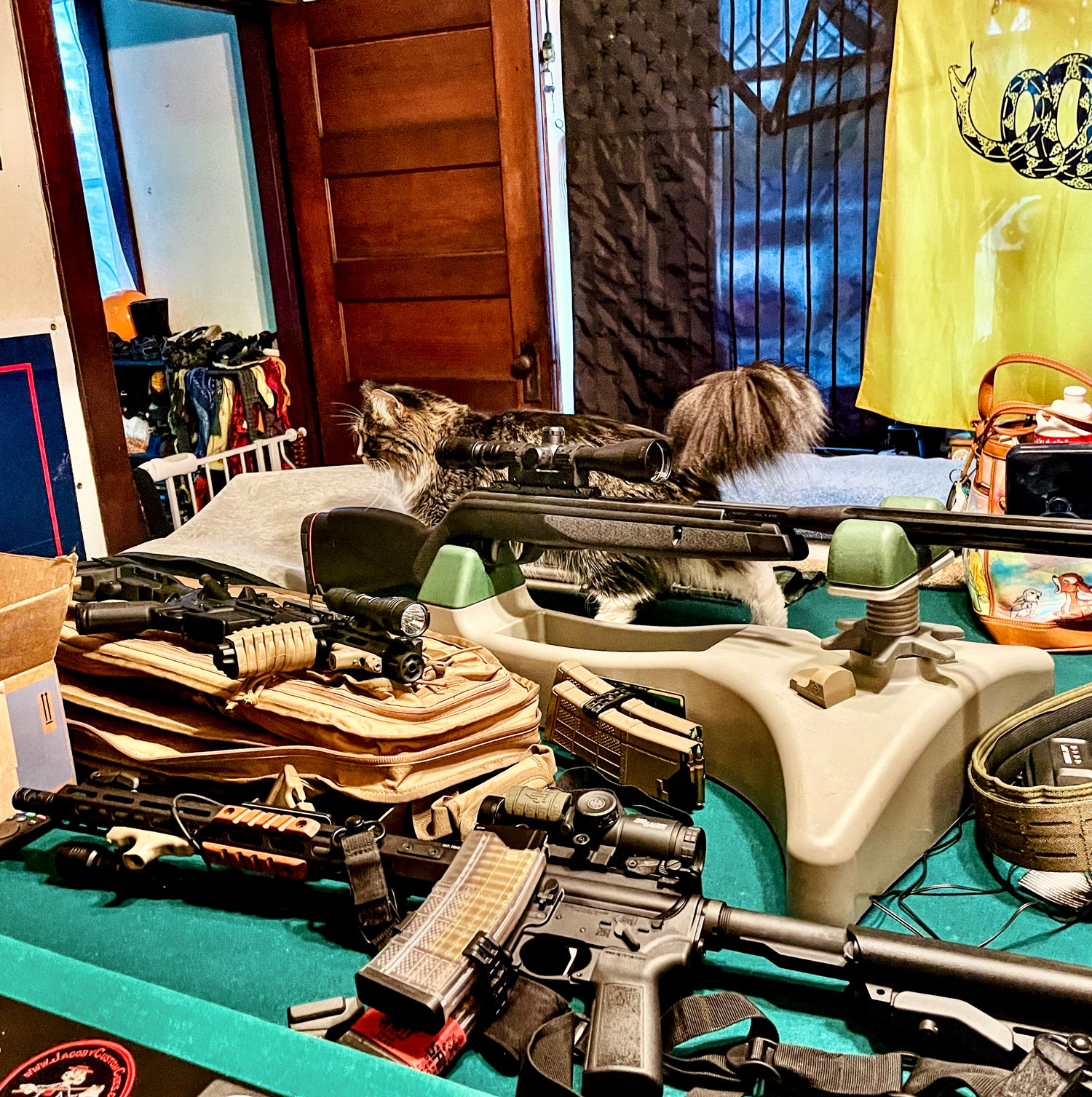I was driving north from Mary when I stopped to take a picture and found myself invited into the home of a militiaman. At first, I just wanted to photograph a “Fuck Trudeau” flag—an eccentricity in America, in Marinette, Wisconsin—serving as a curtain in a house. Quick work; I left the car running. But I tripped a motion sensor. A woman with cascading honey curls, broad-armed in a tank top, appeared on the back porch. “Whatcha doing?” she asked. I didn’t know then that Megan Brumm had clocked me as soon as I’d pulled up to the curb, that by the time I squeaked “Hi!” I’d already breached two of what the family Brumm calls its “frontiers.” I was a stranger on their lawn, which is to say I was one of three things: (1) a Fed (don’t shoot, yet); (2) an intruder (be prepared to shoot); or (3) a fool (until proven otherwise).
I aced the third option without even trying. I said I was a writer wandering Wisconsin, making pictures of flags, asking questions about the division of America. Megan brightened. Her husband was a photojournalist! (Also a wedding photographer.) She was joined by a lean, sharp-shouldered young woman wearing an oversized pink tank top that read pink. Her eldest stepdaughter, Athena. Baroque ink spiraled round Athena’s thin bones. Megan went to fetch her husband, Rob. Athena gazed down on me, dead-eyed. Her aim, I’d learn, was the best in the family’s. Rob emerged: big, buzzcut and camouflaged, a .45 holstered on his hip. I explained again about the flag. “Want one?” Rob asked. It felt unwise to say no, so I stood dumbly while Rob fetched me my very own “Fuck Trudeau” banner, still wrapped in plastic. He’d bought them two-fers in solidarity with his Canadian friends. He had a lot of friends, he said, and he had nothing to hide, even if some things would remain “classified,” so he invited me in. Inside, on a pool table, there was—well, I asked if I could take a picture of their cat. “Twitch,” said Rob, smiling at the kitty. He clicked on the overhead for better lighting—

The Brumms had four cats, and in addition to Athena there was a three-year-old with streaming blond locks zipping around the table. Everybody shoots, even the little one. How many guns between them? Classified. But those that I could see, said Rob, were as legal as his combat-grade body armor. He hoisted it to demonstrate its weight, far greater than that used by the police, which he deemed unfit for real battle. “You can shoot me with a nine-millimeter in the chest all day long, and I will laugh at you.” He shouldered the armor sometimes eight hours a day. Training, he said; “I am the head of a local militia.” Rob slapped a red patch onto the pool table’s felt. 4th wisconsin inf-red arrow militia, it read. legio iv felix fortunata—Fortunate Bearer of Thunderbolts. (I find no record of it online. “That’s the idea,” said Rob.) The gear was for an upcoming training operation. “Last Friday,” he said, “we did night ops.” He showed me, finger on the trigger, and Megan laughed at my wide eyes.
When Rob thought about abortion, he started with guns. The question for him was not whether abortion is right or wrong. The question was: When will China invade? The question was: Can we afford to spare potential infantry? “If you make the top ten of things that keep your country running, abortion is not in the top five hundred. But ten years down the road, if I have a war and I’m a leader, and you and the Black population have aborted forty percent of their babies for the past thirty years, I’m running out of foot soldiers. Abortions are bodies that never make it to my front line.”
(It’s true that a higher percentage of Black pregnancies end in abortion than White ones. Rob’s even right about the number 40. But not the percent: It’s 40 out of 1,000, according to the American Journal of Public Health. That is, 4 percent.)
Rob called himself “pro-choice,” but that term, too, meant something different in his vernacular. He meant that the choice of whether or not to murder a baby is up to you. “If you choose to do something that’s medically possible, I’m going to leave it between you and God, until it affects me in the state of readiness of my defense.” Readiness. It required panopticon paranoia, looking for threats down every sightline. Rob looked at falling birth rates. He looked at what he considered Mexico’s invasion. He looked at what he suspected will be civil war according to a rural/urban divide—in which, even though he lived in town, he would side with the land he held outside of it. He looked at China, he noted they ended their population-control program in 2021, he contemplated 1.4 billion Red Chinese divided by half and then by some factor again to account for age and thought of hundreds of millions of Chinese wombs churning out multiple Chinese babies—in fact, the Chinese birthrate is dropping—and he thought, “they’re getting ready.” For the future war. “You start prepping several generations ahead to have bodies when you lose so many bodies that you need a level of fresh bodies you never dreamed you’d have to dig into.”
This way of thinking was, he acknowledged, “macabre.” But the macabre has flowed into the mainstream, and Rob’s convictions are more moderate, in fact, than much of Fox News. Rob did not recall having heard of “Great Replacement Theory,” the idea that the Left seeks to make conservatism—read, Whiteness—demographically dwindle even as it opens U.S. borders to non-White “invaders.” Rob just thought it up all on his own. His ideas are no longer marginal. He knew this, felt it—the gravity drawing men with guns to the center—on January 6, his photographs of which played in a loop on a screen mounted in the corner of the living room, over his youngest’s toys, next to a Call of Duty: Black Ops poster. Did he carry at the Capitol? “I would not answer that question.” What he would say is: “I did not get robbed by ‘joggers’ coming out of D.C.”
He claimed his militia numbered 6,700. Later, on the phone, he made it 7,500. Were the numbers real? Inflated, perhaps, but maybe also real enough. As I’d been driving, I’d been listening to a book called How Civil Wars Start, by a political scientist named Barbara F. Walter, who, in a final chapter, projects a hypothetical commencement in Wisconsin. Like Rob, I wanted to be prepared. I’d learned that we’re in a golden age of militias—if you like militias—and that there are more citizens armed and organized now in varying postures of incipient insurgency than at any time since the last civil war. “Right-wing terrorism used to rise and fall depending on who was president,” writes Walter, surging in response to Democrats and subsiding with Republicans. “President Trump,” writes Walter, “broke the pattern.” Trump said more, and the militias heard, all the new little armies formed in panicked response to Obama metastasizing. Trump said, “stand by,” and they gathered.
Rob called January 6 a false flag—a hoax, staged—even though he was there. I’d been listening to the January 6 hearings, but who else had? Nobody I’d met on the road. Everybody seemed to know someone who’d participated (or, like Rob, had participated), and yet nobody believed it’d really happened. If, as F. Scott Fitzgerald suggested, “the test of a first-rate intelligence is the ability to hold two opposing ideas in mind at the same time and still retain the ability to function,” such cognitive dissonance is the awful genius of our ecstatically disinformed age. “Pro-life.” “Free speech.” Athena, for instance, embraced fascism and yet bridled at the name. “They call me a Nazi,” she muttered, sitting stooped on a tall chair beside the pool table. “Just because of my German-flag tattoo.” Sometimes, she said, they told her to kill herself. She didn’t say who “they” were. She bent her shoulder to show proof of “their” idiocy: “They” couldn’t even tell the difference between a swastika and the Iron Cross. Yes, it’s true that the Iron Cross in conjunction with a German flag was last used by the Third Reich; but before that it was a symbol of Imperial Germany, and it was to that long-gone nation, she said, that she had dedicated a swath of her left shoulder. “Honor and Glory for Germany,” she said, her voice a low drone. Which was complicated, because Rob considered himself Jewish. “I’m not,” Athena said. “You’re Jewish by blood,” Rob said. Athena ignored him.

Raised Lutheran, Rob said he discovered that his immigrant forebears had converted upon arrival in the late nineteenth century, fleeing pogroms. Pogroms he could understand; he feared they’ll be directed against gun owners. He decided to reclaim his heritage. Details of how and when were classified, but he was, he said, a man of God. He said he was not a Rothschild, which is true, and that Hitler was Jewish, which is not. He said four cats purred through the armory because four is one of the numbers of God, and when I said I’m a Jew, too, but I’d never heard that, he laughed and told me, “You’re a baaad Hasid,” which, fair enough. (He was right, though, sort of, about four, especially if you’re into gematria, the Jewish code of numbers and words and hidden meanings popular now with anti-Semitic conspiracy theorists.) He said his anti-Semitic comrades in the militia respected him despite his Jewish blood because they’re like a wolf pack. He was the alpha. He ruled by strength. “They will depose me, if I deserve it.” A radio on a shelf behind him crackled. “And I don’t deserve to be deposed.” Such was democracy in the Wisconsin Fourth Inf. Red Arrow Militia.
“Are you in the militia too?” I asked Athena.
“I guess,” she said. She wasn’t the eye-contact type.
“She’s one of the people who can actually shoot,” Rob said proudly. He’d already explained his belief that of every 100 soldiers (he’d said he’d been 82nd Airborne) only twelve are capable of killing another human being, and only two are good at it. “She would be one of the two out of a hundred that I’m absolutely certain of.” When, advising me on home defense—the broad pattern of a shotgun wouldn’t work, he said, if the bad guy was holding your daughter hostage—he demonstrated by sighting an inch from Athena’s face. She didn’t flinch. She agreed that were she being held as a shield she’d want her father to use an AR. That’s what she’d use if the tables were turned. She had ideas of her own about firepower, seemed to be murmuring calibers to herself as Rob spoke, too low for me to comprehend. He pointed to the ARs on the table. He said the three-year-old had already trained on them. “Shooting prone,” the little guy lying on his belly, blasting away. “It’s really kind of cute.”
“How old were you, Athena, when you started?” I asked.
Rob answered for her. He picked up a very large handgun, a Taurus Raging Bull, .480 Ruger, which, he thought, looked like the mile-long barrel seen in Dirty Harry. “She was holding this revolver when she was two and a half.”
“Two,” Athena corrected.
“How?” I asked, incredulous.
“Two hands,” said Rob, a proud papa.
“Favorite thing to hold,” Athena said.
Rob cocked it. “God, I love this.”
Athena too—I caught just two words of her undercurrent commentary: “An elephant gun,” she said, smiling, nodding, thinking of its uses.
Jeff Sharlet is a Dartmouth professor of English and creative writing. Excerpted from The Undertow: Scenes from a Slow Civil War, copyright © 2022 by Jeff Sharlet. Reprinted with permission from W.W. Norton. All rights reserved.




